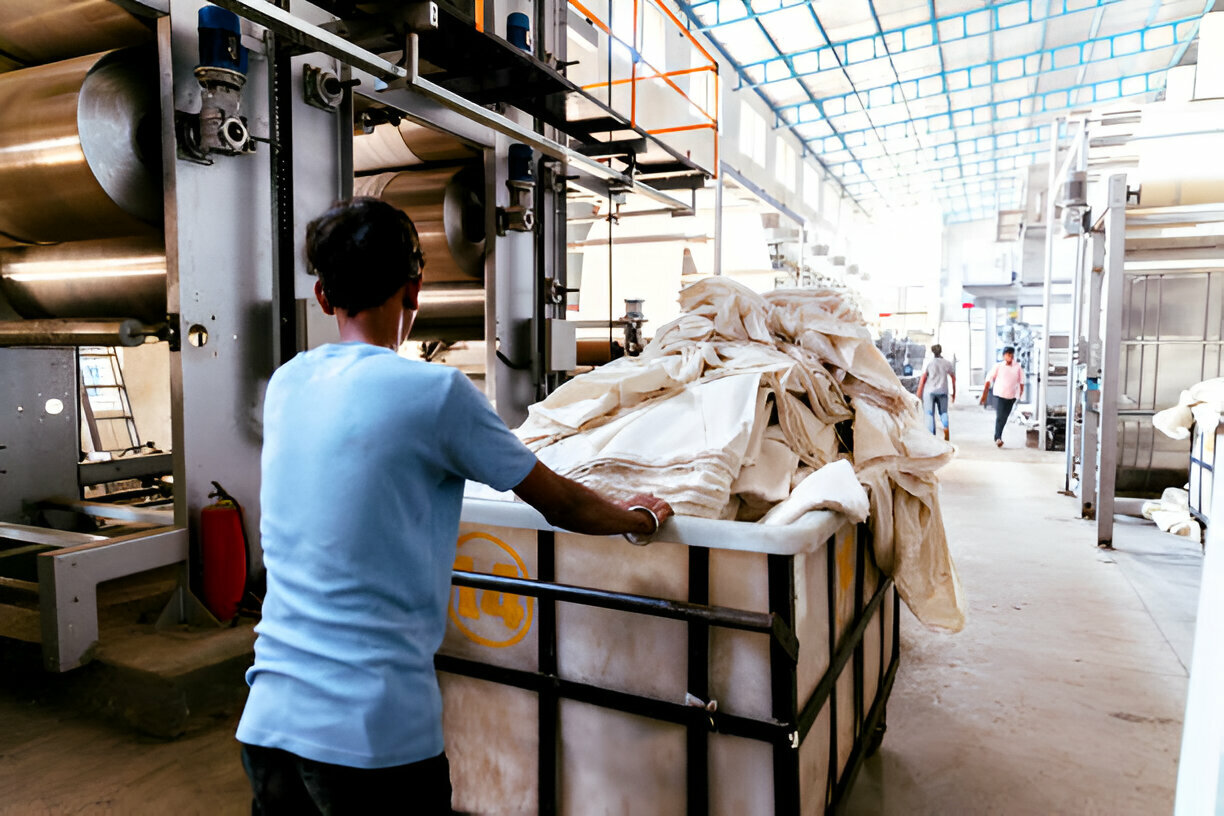Textiles are one of the oldest and most important industries in India. The industry constitutes a major chunk of India’s contribution to GDP, and employment to millions of its people. Indian textile ranges from traditional handloom and woven to modern high-tech textile manufacturing. Indian textile companies are known for their innovation, quality, and scale, and have received international recognition. These companies have operations in different segments: cotton, silk, wool, and synthetic fibers, which contribute to the manufacturing of garments, home textiles, and technical textiles.
In recent years, there has been increased emphasis on sustainability, eco-friendly production methods, organic material usage, and recycling. Such companies are leaders in the Indian textile industry, able to find their correct pace with changing market trends, respond to consumer demands, and harness technology with higher productivity. From large conglomerates to specialist manufacturers, these companies have made India the world’s largest and most diverse textile manufacturer, shipping to markets worldwide.
The following sections will shed light on the top 10 textile companies in India and serve to illustrate these firms’ involvements, positions in their markets, and the impacts and influences toward a future course for the Indian textiles industry.
Emerging Trends in Textile Industry
Innovation, sustainability, and more significant calls from consumer circles are forcing a transformation in the textile industry. Some of the primary changing trends in textiles are as follows:
1. Sustainable and Eco-Friendly Fabrics: Sustainable textiles, organic cotton, bamboo, and hemp are considered some of the eco-friendly materials being used by companies. Utilization of recycled fabrics and biodegradable fibers is becoming popular to decrease the negative impact on the environment.
2. Smart Textiles and Wearable Technology: Wearable technology was enabled by smart fabrics with sensors and electronics. These textiles can measure health metrics, track physical activity, or change color or texture based on environmental stimuli.
3. 3D Knitting and Digital Fabric Printing: With 3D knitting, it is possible to knit clothing without sewing and digital fabric printing can print even the most intricate designs directly on the fabric, thus avoiding waste and faster production.
4. Artificial Intelligence and Automation: AI will change the making process from the design to the production process. AI will forecast trends; optimize fabric and supply chain even improve delivery times
5. Eco-friendly Dyeing Techniques: The process is resource intensive, and pollution of traditional dyeing. New emerging sustainable dyeing techniques, Waterless dyeing, Natural dyes etc. are widely being adopted by the textile and apparel industry.
6. Ethical Manufacturing: Transparence: Clients are more responsible today and concerned about the social and environmental ramifications of what they buy. Textile companies have taken up transparency practices, which describe the source of raw materials along with labor conditions and the environment.
7. Upcycling and Pre-Loved Fashion: The trend of upcycling revolves around changing old garments into some other form to present themselves as new designs. In harmony with that, second-hand and vintage fashion triggered by sustainability boosts up.
8. Nanotechnology: Nanotechnology will be integrated into textiles where those fabrics can eventually be produced with features like water resistance, stain resistance, and longevity without affecting the comfort aspect in any manner.
9. Local and On-Demand Production: On-demand and local production are also becoming increasingly feasible with the improvement of digital printing on fabrics and 3D knitting. It also supports waste reduction, reduces transportation costs, and responds to the demand for customized products.
These new tendencies are transforming this industry into becoming more sustainable and innovative in addressing the demands of modern consumers; hence, with technology and awareness from modern consumers, things are expected to be even brighter and greener in the face of the changing future of the textile industry.
List of the Top 10 Textile Companies in India
1. Bombay Dyeing and Manufacturing Company Ltd.
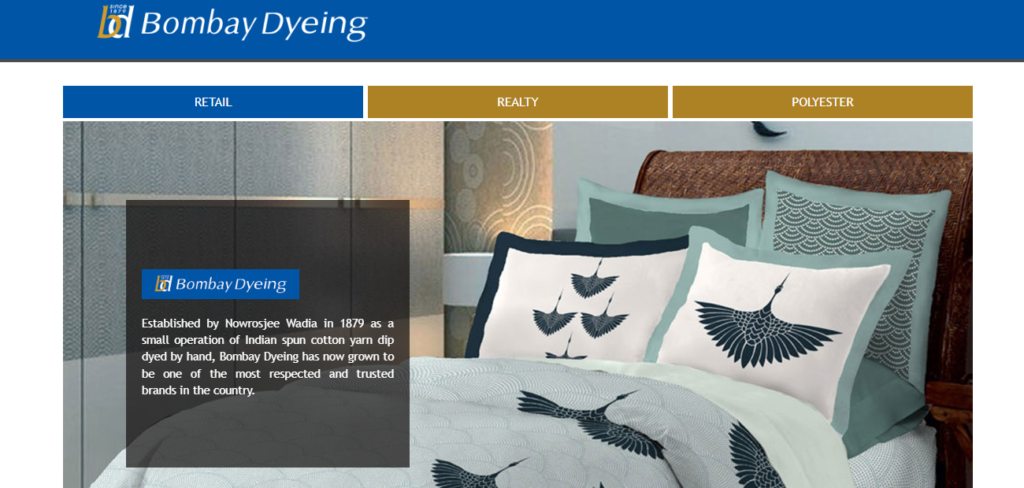
Bombay Dyeing and Manufacturing Company was established in the year 1879 and the company is among one of the leading textile companies of India. Situated in Mumbai the company’s area of operation focuses on providing premium home textile products such as beds and bath products. In this company we find exquisite and artistic furniture innovation, superb quality and contemporary designs optimized for domestic and export markets.
Continues to be an important player in the textile industry while covering new verticals such as real estate business as well as the production of polyester staple fiber. Having been in business for over a century it is a company that has managed to closely stick to the quality of its products, while at the same time embracing the modern trends in style.
2. Bombay Rayon Fashions Ltd.

Bombay Rayon Fashions Ltd is one of the core textile organizations in India. It offers many items, including Tencel, Lycra, Wool, and Polyester. It has an excellent texture fabricating limit. It is increasing as one of the essential textile companies. They have a massive presence in the plan, yarn colouring, weaving, texture handling, and piece of clothing assembling, besides retail value chains.
3. Fabindia Overseas Pvt. Ltd.
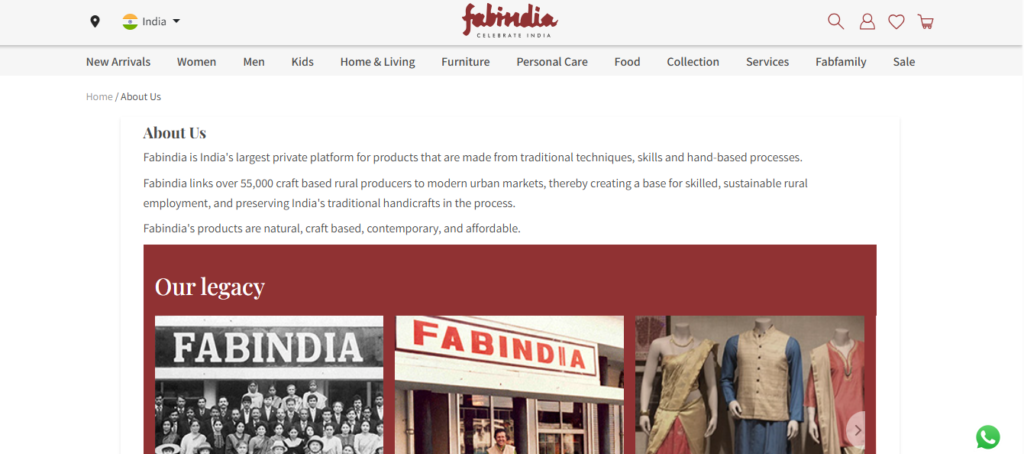
Fabindia Overseas is one of the Leading Indian Retail Brands, that focuses on Inspired Indian Ethnic Products Companies. It was founded in 1960 by John Bissell and the firm brings together rural artisans and consumers with quality handcrafted products including garments and textiles, home décor, organic food and personal products. The company has entities for sustainable business, handloom, cotton-silk, and wool items, over thousands of artisans across India.
Being an India-based company, Fabindia has claimed a domestic and global market niche to target the audience that is inquiring about traditional, natural and aesthetic goods. This has made Amrapali the iconic hub of traditional arts and crafts of India and sustainable retail shops.
4. Grasim Industries Ltd.
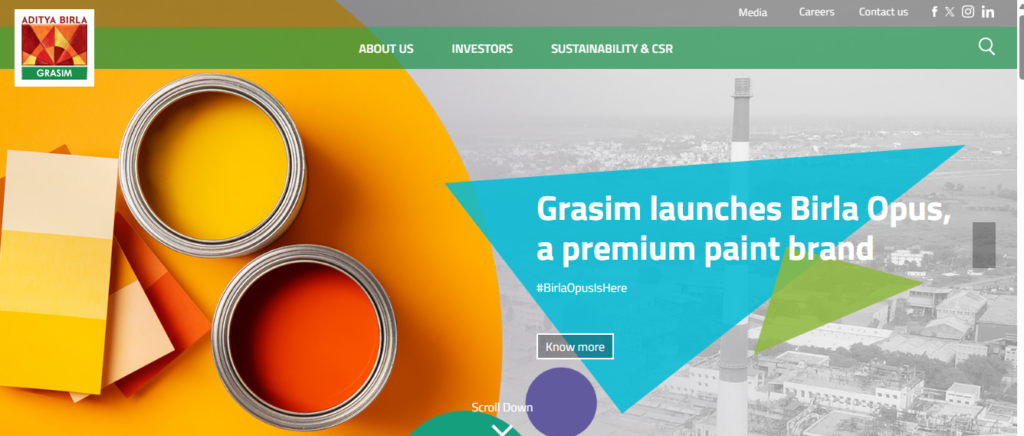
Grasim Industries Limited is a part of the Aditya Birla Group and this is one of the largest, Formed in 1947 in Mumbai this is a leading company in the textile and chemical industry. It is the world’s largest manufacturer of viscose staple fibre (VSF), a texturized chemical used in fabrics and a leading manufacturer of caustic soda.
It also has a huge operation in the cement and finance sector through two companies UltraTech Cement and Aditya Birla Capital. Having established itself as a trend driver in innovation and sustainability, Grasim plays an important role in the development of India’s Industry by delivering both its products and services sustainably and responsibly to its society.
5. JCT Ltd.

JCT Limited which was established in 1946 having its headquarters in Punjab, India is one of the famous textile companies of India. JCT is a member of the Thapar Group and has been successfully offering fabrics and yarn to many countries all over the world.
Today it is an established company that is involved in providing different textile products such as cotton, polyester and blended textiles for fashion, sports and Industrial usage. JCT also has a reputation for implementing the strategies of sustainability not only in its products but in manufacturing processes as well. JCT has always maintained its influence in the textile industry of India due to its performance and strong market position.
6. Karnataka Silk Industries Corporation Ltd.

KSIC is one of the famous government-owned undertakings, which has been holding the Karnataka state in producing premium silk products. Set up in 1912 and situated in Mysore, KSIC is known for its splendid ‘Mýsore silk sarees’ which are famous for their classy, quality and intricate work. The business is involved in reeling, and sometimes winding, and finally weaving silks, to the highest standards.
Most of the KSIC’s products are made out of pure silk and gold zari which represents the tradition and culture of Karnataka. This includes the effort put in place to ensure that the traditional method and technology being used by the company are up to date in providing the required services, a factor that has seen KSIC as the queen of weavers in the silk industry in India.
7. Raymond Ltd.

Raymond Limited, founded in 1925, is a leading textile and fashion brands company in India. Raymond Ltd is a leading brand situated in Mumbai it offers a broad portfolio of superior woolen collections apart from suitings. It consists of ready-made garments, home textiles, and shirting fabrics – such a diverse basket helps hedge risks.
The company is running through several brands which include Raymond, Park Avenue, and Color Plus and has a vast market both nationally as well as internationally. Raymond has also major stakes in the real estate/retailing business. Considered to be one of the best textile industries in India, Raymond has always produced quality textile products that come up with innovative and marvelous designs.
8. The Lakshmi Mills Company Ltd.
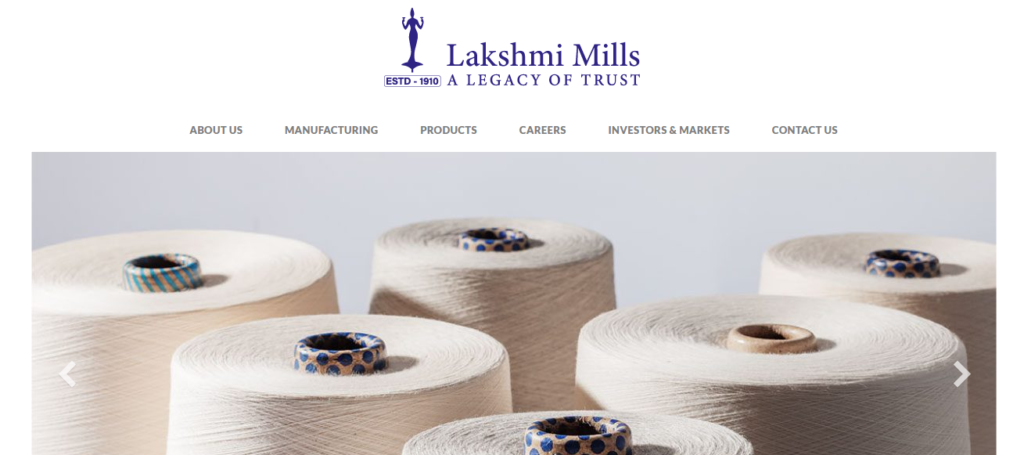
Lakshmi Mills Company is the oldest textile company which was established in 1910 the company is situated in Coimbatore, Tamil Nadu India. Lakshmi Mills focuses on the manufacture of cotton yarn and fabric of excellent quality to fulfill local needs as well as export.
The company has always possessed technologically advanced production plants and implemented high-quality production processes. They make woven garments, yarns as well as blended fibers for clothes and home textiles. Lakshmi Mills has been thus known to be a reliable and excellent organization contributing significantly to the textile industry of India.
9. Vardhman Textiles Ltd.
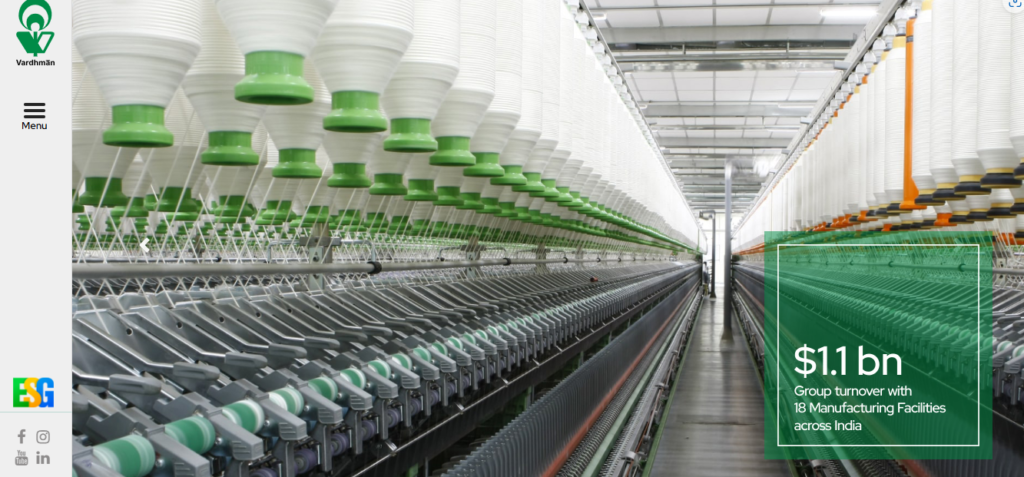
Vardhman Textiles Limited started its operations in 1965 and is located in Ludhiana, Punjab Vardhman is one of the biggest textile companies in India. The company focuses mainly on yarn, fabrics and garments production with markets both at the domestic level and export markets. It’s one of the largest manufacturers of yarn for both domestic and international markets with products ranging from cotton, polyester, blended yarns, fabric and sewing threads.
In terms of responsibility, the company is concerned with sustainability and has integrated environmentally friendly factors into the production line. Vardhman Textiles has been able to maintain its competitive edge in the textile business as it enjoys a strong basal and focus on innovation.
10. Arvind Ltd

Arvind Limited was established in 1931 and has its operational base in Ahmedabad, Gujarat; The company is a renowned textile manufacturer and exporter of India. Arvind is one of the leading branded denim manufacturers and suppliers of denim, cotton and woven fabrics for both domestic and international markets. The garment marketing firm majoring in branded apparel under Flying Machine, Arrow, and Calvin Klein among others in India.
Arvind also started sustainability in his company engaging in humane production methods and sustainable innovations such as waterless denim production. Introducing innovation and quality into its production, Arvind remains the leader of the textile and fashion markets.
The Future of Textile Companies in India
- Increased Focus on Sustainability: Manufacturers will continue to adopt green technologies in production and use green materials in a bid to meet growing greengetHeight in textile services.
- Adoption of Technology: The use of robots and the application of artificial intelligence as well as going digital in the production of printing will enhance the speed of production, and product differentiation.
- Growth in Export Markets: On the two wheels of Quality & Innovation, Indian textile companies will expand their outreach, especially in apparel, home textiles and technical textiles.
- Innovation in Fabrics: Combined with a focus on smart textiles, functional fabrics and textile recycling, new areas of application of textiles will be opened.
- Improved Infrastructure: The policy undertaking of the government to upgrade the textile infrastructure and logistics is capable of making a positive impact on the international market status of the Indian textile firms.
- Shift Towards Local and On-Demand Production: Localized and manufacturing on-demand will also be a trend since this is what the consumers need within a short duration.
- Rise in Domestic Consumption: As there is likely to be an increase in the middle-aged population in India more demand for textiles in fashion, home textiles and technical textiles would be expected in the future.
- Skilled Workforce: In the future, it will lead to higher investment in skill development programs or make the textile sector workforce much more capable and innovative.
- Circular Economy Initiatives: Increasingly more organizations will start to think about their textile waste from recycling, reusing and reducing perspectives by a globally emerging circular economy.
- Collaboration and Strategic Partnerships: Textiles and apparel companies will therefore engage with international brand name owners and technological advances as to how to compete in the global market as a strategic move.
The Role of Textile Industry in Economic Growth
Textile industries are the most important industries in the growth of many countries with a focus on emerging economies such as India. Here’s how it contributes:
- Employment Generation: A huge number of employees are engaged in the textile industry due to its labor-intensive nature, especially in the developing world. It gives employment in spinning, weaving and dyeing, retailing and other areas thereby eliminating high levels of unemployment and poverty.
- Contribution to GDP: From experience, the textile industry plays an important role in the GDP of most countries both directly and indirectly. This includes the production, trading and consumption of textiles.
- Exports and Foreign Exchange: The textile sector is one of the major sources of the export of foreign exchange earnings. Countries such as India, China, Bangladesh etc are exporters of textile products which improve their trade balance and enhance their economies.
- Support for Secondary Industries: The multifaceted economic impacts of the textile industry include: Agriculture: The growing demand for cotton for textile production boosts the agribusiness; Chemicals: processing of textiles requires dyes and chemicals, therefore textile industry triggers the chemicals business; Machinery: domestically, it encourages the machinery industry and indirectly boosts the growth of global textile machinery industry as more and more industries adopt advanced technologies; and Transport: the industry fosters the transport industry since it requires the
- Fostering Technological Innovation: The demand for advanced textiles in today’s world has paved the way for research and development and innovation in textile fabrics, technology-sustainable Manufacturing and productivity for economic advancement.
- Infrastructure Development: The pressure to optimize supply chains, transport and logistics has put a lot of investment into roads, sea ports and warehousing thereby enhancing economic development.
- Rural Development: The textile industry is located in a decentralized manner, with the largest concentration being in rural areas and hence provides a flow of investment along with infrastructural developments in these areas hence encouraging the narrowing down of rural- rural-urban divide.
- Attracting Investments: On the side of demand, the international market for textile products, as well as the future expansion of the industry, encourages investments, both at home and from abroad, to boost other economic sectors and set up a propitious climate for business.
To sum up
India’s textile industry is among the largest industry sectors in India and is a mixture of tradition along modern technology. The leading textile companies like Arvind Limited, Vardhman Textiles Ltd., Raymond, and Welspun India have not only made the domestic market more competitive but also made India the largest supplier of textiles and apparel in the global market. These are companies that specialize in creating superior quality goods and services and new manufacturing technologies, and can integrate future trends such as green economy and Industry 4.0.
With the launching of new schemes like the Production Linked Incentive (PLI) scheme and the increasing need of consumers to opt for sustainable and new-age textiles, these companies will be soon reaching even new heights. This highlights the fact that they do not only make positive economic contributions since they help provide employment and assist many peripheral industries throughout the country.
Today, these companies have fitted into new higher technologies, environmentalism and competitive exportation strategies as the global textile market shifts. They also keep a balance between classical Indian workmanship and the use of modern technology to maintain the Indian Textile fabric in the international market and their beauty.
In conclusion, the top Indian textile companies are not only businesses but more importantly they are brand ambassadors of the Indian textile industry. They are an example of the industry having an impact on the economy, employment, ain the global map positioning of India as a textile powerhouse.
Faqs
Which is the No. 1 textile city in India?
Bhilwara has emerged as India’s largest fabric manufacturer. Also known as the Textile City of India, it is a famous industrial town in Rajasthan. It encompasses 50 per cent of the total polyester fabrics besides suits manufactured in India.
Which textile is famous in India?
India is famous for its exquisite silk production, with the finest silks being fashioned in Varanasi and Kanchipuram. These fabrics are used to create the most luxurious sarees in addition to dhotis, making India the second-largest manufacturer of silk in the world.
What is India’s rank in textiles?
India holds a 4% share of the U.S. $ 840 billion global textile and apparel market and is in fifth position. It contributes 3% to the Indian Gross Domestic Product, 7% to Engineering Output, 12% to India’s export earnings, and provides more than 21% of total employment.
Read More:
